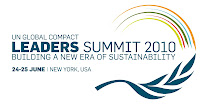 Upon landing in Toronto Saturday I could already see it: The G20 heads of states are in town and their modest means of transportation were neatly parked at Pearson International Airport: Obama's Air Force One, Two Jumbojets each for the Chinese, Japanese and Saudi-Arabian Heads of state, Merkel's and Sarkozy's relatively modest Airbuses, and – how cute – the Virgin Atlantic A340 which must have shipped the new British PM Cameron to TO. Telling array of status symbols...
Upon landing in Toronto Saturday I could already see it: The G20 heads of states are in town and their modest means of transportation were neatly parked at Pearson International Airport: Obama's Air Force One, Two Jumbojets each for the Chinese, Japanese and Saudi-Arabian Heads of state, Merkel's and Sarkozy's relatively modest Airbuses, and – how cute – the Virgin Atlantic A340 which must have shipped the new British PM Cameron to TO. Telling array of status symbols... I
The G20 is another 'tool' of global governance, similar to the Global Compact. But while the Compact receives only scant attention from the public, the G20 is a major event. It leaves you wondering. For me this reflects, once more, the value and benefits of the UN Global Compact. And indeed also the value of the Summit.
Reflecting back, it is chiefly about two things. The first is to legitimize the social role and responsibility of business within the business community. By getting 8,000 players on board, many of them well known brands, the issues of sustainability/CSR/Ethics are now a legitimate concern in the wider business discourse. Of course there is room for ambiguity about individual companies, their achievements and sincerity. But for me the glass is definitely half full. It is mostly about initiating a process, rather than the concrete outcomes, which we should credit the UN Global Compact for. Andreas Rasche (together with Georg Kell) has just published a fine book on the compact taking stock of its achievements and shortcomings. My colleagues and friends Andreas Scherer and Guido Palazzo describe it well in the book: the Global Compact is one tool of global governance, providing a framework for deliberation and learning around the social role of business in a global economy.
The second point for me is that in particular the summit has very much a ritualistic role. As humans, we need rituals and ceremony to visualize, materialize and provide a cognitive frame to inner processes of commitment, of attitudes and thoughts. This is what weddings, funerals, graduation ceremonies etc. are all about. The summit provides such a frame. The leading persons of organizations attend (in fact a third of attendees in my count were actually top brass), make statements of commitment or achievement, are together in the room, and do so under the auspices of the highest formal political authority on the globe: the UN Secretary General. That is one of the reasons Ban-Ki Moon's remarkable commitment to the Compact is vital.
Contrasting this to the G20 and its outcomes here should make Georg Kell and his team a little proud of what they have achieved. At the G20, leaders have basically decided to land large chunks of their middle class constituents with the burden of the debt, countries had to take on in saving the global financial system. To halve the debts by 2013 boils down to little else. No wonder such an agenda needs fences and thousands of police to be sustained. The level of 'stationary violence' by the state in Toronto this weekend in my modest view was much bigger than the few incidents of vandalism by protestors – as much as we condemn this violence. The G20 is an example of lack of deliberation and democracy at the global level. The UN Global Compact Summit points to the opposite: smaller or bigger steps towards common solutions to pressing issues on the global level.
That is why I think it was worth it.



 See it here: http://www.un.org/webcast/globalcompact/leaderssummit2010/
See it here: http://www.un.org/webcast/globalcompact/leaderssummit2010/



